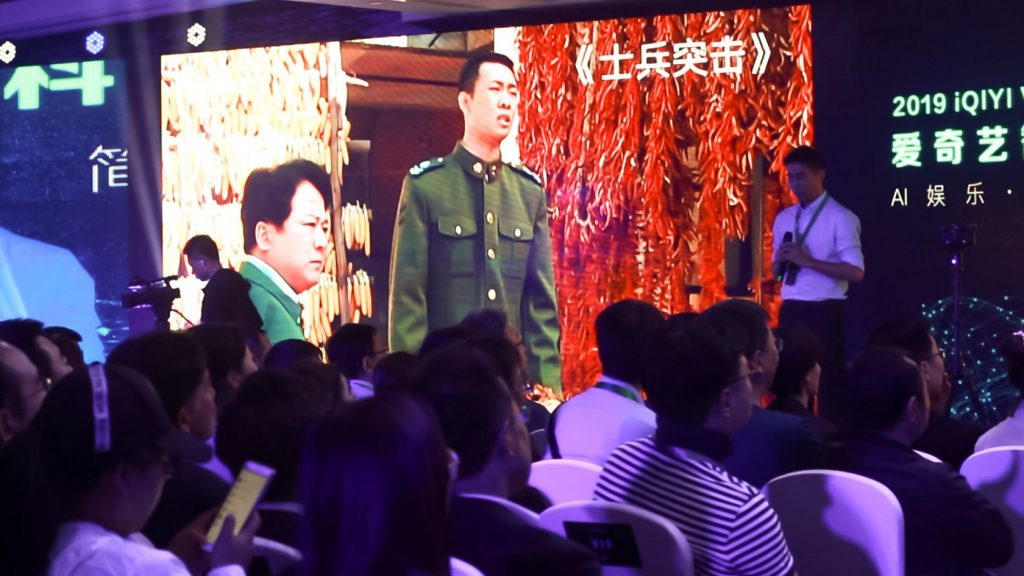Liu Wenfeng, chief technology officer at Baidu-owned platform iQiyi—sometimes known as the “Netflix of China”—insists that the platform is more than just a copycat.

Liu Wenfeng, chief technology officer of iQiyi, spoke with TechNode on May 9 at the company’s 2019 World Conference in Beijing. (Image credit: TechNode/Cassidy McDonald)
“Last year somebody called us Netflix Plus … but we have more than that,” Liu told TechNode. Referring to their expanding range of content formats and methods of monetizing content, he said, “We’d rather call ourselves an online Disney.”
Unlike either Netflix or Disney, however, iQiyi is still bleeding cash as it seeks to level up content as well as its paying subscriber base. While its efforts have seen success, the platform faces a long road to profit that is hemmed in on either side by competitors and new tech trends.
However, 2018 was a bright spot for growth in both original content as well as number of subscribers, which shot up 72% year-on-year to 87.4 million. iQiyi’s performance was a highlight for Baidu’s overall year-end earnings report, although the streaming site also racked up RMB 9.1 billion ($1.3 billion) in losses.
On March 31, iQiyi reported that subscribers had risen to 96.8 million, up 58% year-on-year, although net losses—RMB1.8 billion—were between four and five times the figure from the first quarter of 2018.
Shelleen Shum, forecasting director at eMarketer, told TechNode via email: “[iQiyi’s] investments in premium content have clearly helped to attract more subscribers. A growing user base will add not only to its membership revenue but also help its ad business remain competitive.”
“However, the online content market in China is very crowded and relying solely on content investment is not sustainable due to the continued high costs.”
Pathbreaking content
At iQiyi’s 2019 World Conference, held from May 9-10, executives announced new strides into the realm of interactive content.
In a sense, they’re late to the party. In December 2018, Netflix released an innovative episode of a popular series, “Black Mirror: Bandersnatch.” Mixing together gaming elements with user choice and metafictional narrative, its debut made a successful splash across English-language media.
However, with the release of their “Interactive Video Guideline (IVG) and Interactive Video Platform (IVP),” iQiyi hopes to create an entire creation and distribution ecosystem for material similar to “Bandersnatch.”
Speaking at the conference, iQiyi senior director Yang Guang explained that more personalized storylines can add color to the entertainment experience: “The more immersive, the better.”
According to an official press release, the IVG is being used to guide content development from conception through plot, as well as production and release. In the future, shows created under these guidelines could be rolled out through iQiyi’s app. The IVP brings together content producers with IP creators and broadcasters in order to publish the new forms of video, and has thus far been used to produce interactive video for iQiyi.
“iQiyi aims to standardize interactive video creation, build an efficient ecosystem for the industry, and explore the possibilities of interactive video in collaboration with our industry peers,” Liu is quoted as saying in the press release.
At the conference, Yang explained that in future iQiyi shows, audience members will be able to actively choose where they want a character to go next, as was possible with “Black Mirror: Bandersnatch.” Alternatively, audience choice might involve switching points of view throughout an episode.
Using the new IVG and IVP, iQiyi announced on May 9, the platform will release an interactive romantic drama titled “His Smile.”

At iQiyi’s 2019 World Conference in Beijing on May 9, executives demonstrated how AI-powered methods are being used to refurbish old movies. (Image credit: TechNode/Cassidy McDonald)
Doubling down on AI
iQiyi CTO Liu Wenfeng also elaborated on another major part of the company’s tech strategy: artificial intelligence.
Starting five years ago, the company has steadily ramped up its efforts in the area. Nowadays, not only does machine learning help recommend content, a la Netflix, but it also helps cast actors and actresses, edit footage, create customized promotional content, and add to the audience’s viewing experience—for example, by allowing users to skip to scenes featuring a favorite actor.
The applications go beyond content production and post-production. “We utilize AI technology to do the content distribution,” Liu said. By better categorizing and recommending content, algorithms are helping to match viewers with the videos they want to see.
According to Liu, AI also helps determine which content is truly popular. In genres such as children’s content, for instance, the sheer number of views don’t tell the whole story—as “kids tend to watch videos multiple times.” Additional factors must be included in any assessment of a video’s impact, including amount of user interaction and number of shares.
The tastes of fans, in turn, can influence what types of shows iQiyi will make next. When asked if the company could reveal its projected hit flick for the summer of 2019, Liu demurred. He did claim, however, that iQiyi’s algorithms for predicting the popularity of a video are highly reliable, with around 88% accuracy.
That helps content producers decide which directions to explore in the future, although Liu added, “We are not going to [entirely] replace the creativity work by human[s].”
Long road to profit
It’s not hard to see how AI can help save iQiyi money in the long term by cutting down on the time required to make decisions, as well as reducing the risk involved. After all, in 2015, Netflix claimed that its technological advancements, including smarter recommendations and improved user interfaces, saved the company some $1 billion each year.
Liu told TechNode that using AI to optimize content classification and recommendation allows iQiyi to get “more value from the same library.”
In addition, Liu said that the platform’s growing user base makes it easier to profit off its increasingly extensive catalog of content. “That scale can dramatically lower our cost and improve our profitability.”
In the realm of AI, the platform has a competitive advantage because it is backed by Baidu, said Shum. “The ability to utilize AI to not only grow its revenue base by attracting and retaining more subscribers but also to realize efficiencies in content production and push down production costs will be an exciting development to watch for iQiyi in the coming quarters,” Shum added.
Interactive videos seem to promise higher overhead without immediate financial reward. But making that leap may be a requirement for iQiyi amid fierce competition from rivals such as Tencent Video or popular short-video apps Douyin and Kuaishou.
“Development of quality content and IP is the core of competitiveness in online video, so these measures are necessary for iQiyi,” iiMedia consulting analyst Li Songlin told TechNode. Even in an increasingly regulated media environment, iQiyi must keep experimenting with its repertoire of content in order to stay ahead.
“Currently, video platforms’ methods for profit are generally in advertising, paid membership business, and IP development. Among these, homegrown IP and tapping IP value are key for profit, but the period needed is relatively long,” Li wrote.
At the World Conference, at least one iQiyi executive pointed out interactive content’s moneymaking potential. In his address, senior director Yang Guang noted that interactive video binds viewers and content creators more closely together. In doing so, more opportunities for user-ad interaction also arise—for instance, by allowing audience members to click on a character’s clothing in order to purchase a similar item.
The foray into new territory could help Baidu’s streaming platform pull ahead of major rival Tencent Video. In a March ranking, research firm Aurora Video placed Tencent Video one place ahead of iQiyi in terms of “value of app traffic” (our translation).
The ranking, an Aurora representative told TechNode, was created using assessments of apps’ active user counts, quality of online traffic, and user backgrounds, as well as the products’ ability to retain user attention and strategically place ads.
In the ranking, Tencent Video’s RMB 12.6 billion value beat out iQiyi’s RMB 12.5 billion estimate. Neither, however, measures up to short-video apps Kuaishou or Douyin, valued at RMB 17.7 billion and RMB 21.9 billion, respectively.
With additional reporting by Cassidy McDonald.
-A version of this first appeared in TechnNode‘s members-only newsletter. Become a member and make sure you don’t miss out.





